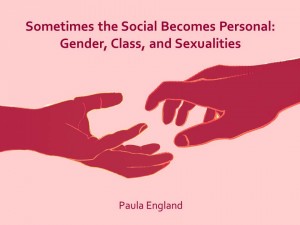
England QA
Contexts is facilitating a follow-up conversation in response to American Sociological Association President Paula England’s Presidential Address. Post your comments here, or email them to editors@contexts.org in the week following her address — before August 30 — and we will assemble them for her. Check back at Contexts.org for her responses, and then participate in a discussion in the comments section.


Comments 7
Meredith England-Markun
August 24, 2015Paula, I loved your speech. It was succinct and very clear -- you covered what you said you'd cover --and with feeling. I particularly liked what you said about the IUD. If those could be made available to 14 year old Latinas, new to this country, the history of those women as a group could be changed, and the history of their families as well. You rock, sweet Paula!
Emily Tillotson
August 29, 2015I found the entire address extremely compelling. Thank you for this work. This idea of efficacy is very helpful in understanding how certain constraints may be formed. I wonder about a couple of things--planning, and life chances and life dreams. Is it possible that planning is somewhat class bound? How do we know low-income women view planning the same way middle class women view it? And, if many life dreams/chances like college, career, home ownership, and marriage appear beyond one's reach it seems less irrational to proceed with one of the only life dreams available--parenthood. Middle and Upper class women have more or less agreed to risk infertility and delay parenthood for these somewhat competing dreams/chances, as you discussed. What motivations do low-come women have to do same? (My apologies for the generalized language, I am trying to be brief.) Thank you again for the excellent talk.
Philip Cohen
August 30, 2015Loved the talk. Very thought provoking, and reasonable. With data.
Devil's advocate: Is this efficacy idea a more "nuanced" rendition of rational choice? Does it lead to different predictions in the end?
Yue Qian
August 30, 2015Paula, I really enjoyed your speech. To bring sociological research to a wider Chinese audience, I write weekly commentary on social events related to gender and family in a Chinese social media platform. After your presidential address, I wrote an article to introduce the theory you proposed in your speech. I drew on this theory to understand why women in China, especially women with lower status in the family (such as rural woman or women marrying the very rich), demonstrate son preferences so that they abort female fetuses or keep getting pregnant until they have a son. When writing this, I realized that often times gender, class, and many other social positions intersect to shape personal characteristics and in turn affect not only their own outcomes but also outcomes of their significant others (due to the idea of linked lives). In sum, I really liked the way you linked the social and personal to understand social gradients in various outcomes.
Reeve Vanneman
August 30, 2015Many many good things in the talk, especially the explicit confrontation of how to deal with ideas that make us politically "queasy". Best of all, it made me think through something. So, here goes, not sure I'm right, but my thoughts are not an ASA address!
The basic argument (apologies here for my mistakes, this is a week later!) is that constraints affect outcomes both directly and indirectly through changes in personal characteristics (including psychological ones like "efficacy"). Perhaps(!) there is an additional, interesting, and general relationship among these 3 concepts; a fourth arrow going from constraints to the arrow linking personal characteristics and outcomes: i.e., an interaction effect. My suspicion is that the relationship between personal characteristics and outcomes is weaker for the more privileged even though they are more likely to have those characteristics; or conversely, personal characteristics count more for the disadvantaged, even though they are less likely to have them.
Case study #1: women raised in middle-class families are less likely to have unintended pregnancies in part (maybe) because they have better access to contraception and in part because they have a higher general sense of efficacy which helps them use contraception more consistently (summarizing England's argument). But, as was said in the talk, when middle-class women do have unintended pregnancies despite their higher efficacy, they have better access to abortions. My guess is that for these middle class women, that reduces the strength of the efficacy-unintended pregnancy relationship somewhat while for working-class and poor women, there are fewer alternative social advantages to "interfere" with the efficacy-pregnancy relationship.
Case study #2 (I have a harder time with this one because as I understand it, for this example, women are more privileged than men -- this is Paula England?). Summarizing: women are less sanctioned for same-sex relationships so they develop more tolerance (i.e., less homophobia) than men, and both because of the weaker objective sanctions (social constraint) and the greater tolerance (personal characteristic) they are freer to engage in same sex relationships. My interaction conjecture is that nevertheless, tolerance is a more important predictor for men than women: because women are, in general, more tolerant, situational determinants (e.g., meeting the right person) are more important. For men, their homophobia gets in the way of any overt sexual relationship no matter what the situation or how attractive the partner, so what matters crucially for men is this tolerance/ homophobia trait.
I am not sure this works, but I do believe from my social psych days (ok, two decades ago!) that psychological predictors usually interact with situational constraints to produce outcomes: in general, you need both a psychological predisposition and a structural opportunity to produce a desired outcome; one without the other isn't much better than having neither.
Sorry for the length.
Reeve Vanneman
August 30, 2015In reply to Philip Cohen:
No, I think efficacy and rational choice are theoretically different. In rational choice theory, isn't everybody is supposed to be rational? people don't act differently or have different outcomes because they have "more" rationality. They act differently because they have different but equally rational responses to different incentives. In the ASA talk, middle class women have more efficacy which makes them more effective users of contraception.
But then again, I have never had much occasion to use rational choice theories so I may be misinterpreting here.
Lauren Fay
January 3, 2020Entire speech of Paula England was very overwhelming and fantastic for me and it was covering every important topic that she promised to discuss earlier. You can check website here to get more help in assignment in NZ. Her concepts about the IUD were really good.